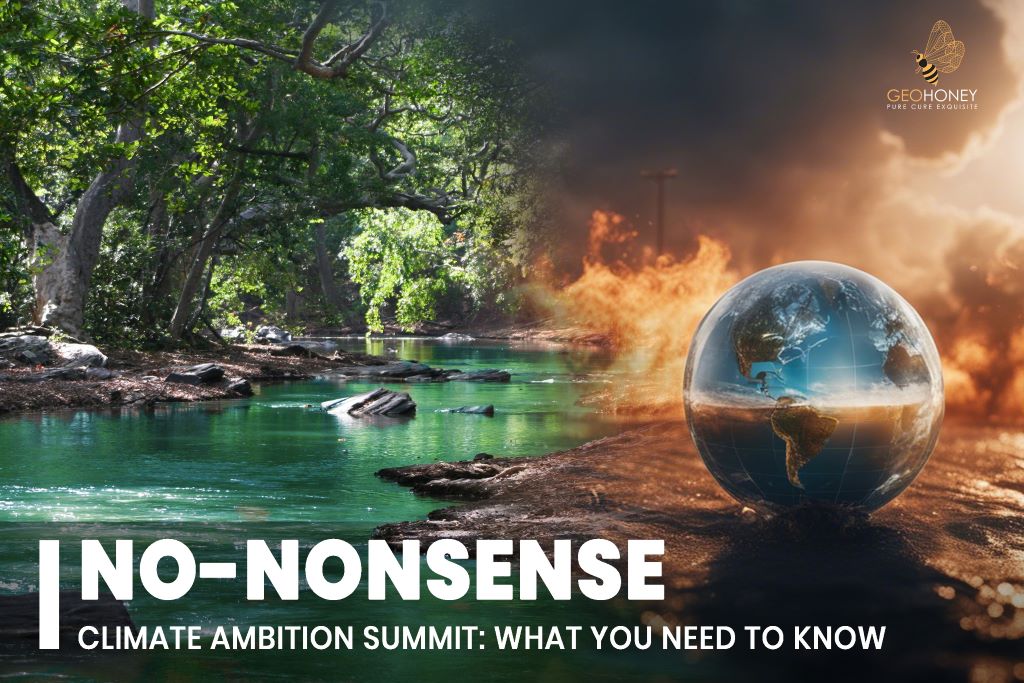- Tokyo: 18:34
- Singapore: 17:34
- Dubai: 13:34
- London: 09:34
- New York: 04:34
What You Need to Know About The 'no-nonsense' Climate Ambition Summit

Almost all indications have deviated or are pointing in the wrong direction. Extreme weather events are displacing millions of people, the earth is warming, and out-of-control wildfires continue to kill and destroy people from Canada to Greece.
Coal, oil, and gas continue to contribute for 75% of global greenhouse gas emissions, fueling the climate problem. While the climate catastrophe has already caused considerable damage, and global greenhouse gas emissions are at record levels, change is conceivable.
There have been other climate summits, but this one will be unusual in that it will feature only the "first movers and doers" - those leaders who reacted to the Secretary-General's appeal for accelerated action to address the climate catastrophe.
The list will include national and local governments, as well as industry executives, financial institutions, and civil society members who can demonstrate credible, ambitious activities, plans, and policies. As a result, the Summit attempts to promote solutions and motivate additional leaders to join the "first movers and doers."
Here are the top five things you need to know:
Time’s up
The climate catastrophe impacts everyone and every country. According to the UN, half of the world's population already lives in risk zones, where people are 15 times more likely to die from associated effects. In the previous 50 years, about 70% of all deaths from climate-related disasters have occurred in the world's 46 least developed countries.
"The era of global warming has ended; the era of global boiling has arrived," stated UN Secretary-General António Guterres. "The air is unbreathable, the heat is unbearable, and the level of fossil fuel profits and inaction on climate change is unacceptable." Leaders must take the initiative. There will be no more hesitation. There will be no more excuses. No more waiting for others to take the initiative. There simply isn't enough time for that."
‘No nonsense summit’
When the UN Secretary-General announced the worldwide event in December, he stated he expected "a no-nonsense summit" with no exceptions or compromises.
"There will be no room for backsliders, greenwashers, blame-shifters, or repackaging of previous year's announcements," he stated.
A growing number of governments, influencers, and leaders are rising to the occasion. The number of countries with national catastrophe risk reduction programmes has more than doubled since 2015. Many people have been involved in efforts like the Secretary-General's Climate Action Acceleration Agenda.
The agenda, which was launched earlier this year, lays out the objectives that government, business, and finance leaders will need to do by 2023 in order to avoid dangerous climate thresholds and provide justice for those on the frontlines. This includes urging countries to "speed up their efforts," commit to no new coal and phase it out, and get to the cleanest finish line possible: net-zero emissions, he said.
The term "net zero" refers to achieving a balance between carbon emitted into the atmosphere and carbon extracted from it. The research clearly reveals that the global temperature increase must be confined to 1.5°C over pre-industrial levels in order to avoid the worst effects of climate change and preserve a habitable planet.
Cleaner ambitions
Government leaders, particularly big emitters, are expected to give performance reports. They will report on where they stand on honouring their commitments to major treaties like the Paris Climate Agreement.
Action plans, often known as nationally determined contributions (NDCs), are also expected. These will range from net-zero targets to promises to the Green Climate Fund, which assists developing nations in raising and implementing action plans to reduce emissions and increase resilience.
All major emitters, including all G20 states, will be asked to commit to proposing more aggressive economy-wide nationally defined contributions with absolute emissions cuts and coverage of all gases by 2025.
Goodbye greenwashing
Business, city, regional, and financial leaders will be expected to produce transition plans that adhere to the UN-backed credibility standards outlined in the UN-commissioned Integrity Matters study.
This voluntary net-zero pledge standard is the only one that is fully compatible with limiting global warming to 1.5°C.
The report advocates for methods to phase out and phase out fossil fuels, as well as emissions cutbacks and a commitment to openly push for science-based climate action.
Climate justice now!
The ultimate goal is to achieve climate justice. This includes taking into account the world's smallest polluters, who carry the more dangerous weight of the world's largest emitters, particularly the G20 countries.
Participants at the summit will discuss the difficulties and opportunities associated with advancing the decarbonization of high-emitting sectors such as energy, shipping, aviation, steel, and cement.
They are expected to reveal climate justice actions. On the ground, this includes shielding more people from climate disasters by 2027 and increasing adaptation funds by 2025.
It will also involve discussions about putting the Loss and Damage Fund into action. The Fund, the first of its type of financial instrument to assist vulnerable nations, was the crowning achievement of the most recent Conference of Parties to the UN Climate Change Convention, often known as COP 27.
Source: news.un.org



